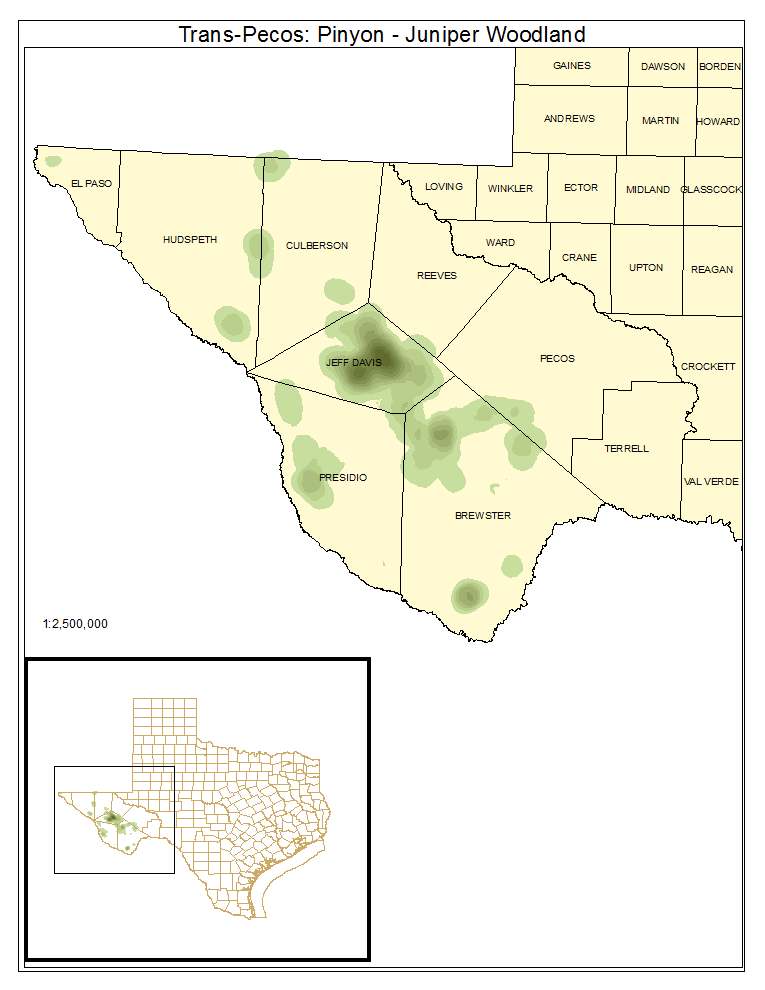Madrean Pinyon - Juniper Woodland
Geology
Mainly occupies Tertiary igneous substrates, including rhyolitic and tuff formations, as well as Permian and Cretaceous limestones. Other substrates such as sandstone and colluvium are also found associated with this system.
Landform
Rugged to gently rolling landscapes of hills and mountains at intermediate elevations.
Soils
The system typically occupies Igneous Hill and Mountain as well as Limestone Hill and Mountain ecoclasses, but may occur on various other ecoclasses, including Limestone Hill, Mountain Loam, Foothill Slope, Igneous Divide, Shallow, Sandstone Hill and Mountain, and others.
Parent Description
This system occurs in the hills and mountains of the Trans-Pecos as well as in Mexico, New Mexico, and Arizona. Soils, often derived from igneous or limestone parent material (but other substrates are encountered) in Texas, are generally dry and rocky on rugged to gently rolling mountain slopes, foothills, and hills. This system can present as shrublands, open woodlands, or closed woodlands. Pinyon pines and junipers typically dominate, but oaks may co-dominate some occurrences and are often present. Pine species typical of the canopy include Pinus cembroides (Mexican pinyon pine), Pinus edulis (pinyon, primarily in the Guadalupe and Sierra Diablo Mountains), or Pinus remota (paper-shell pinyon). Junipers codominating with the pines include Juniperus deppeana (alligator juniper), Juniperus pinchotii (redberry juniper), Juniperus monosperma (one-seeded juniper), or Juniperus coahuilensis (rose-fruited juniper). Oaks, which may be present to codominant with pines and junipers, include Quercus grisea (gray oak), Quercus mohriana (Mohr’s shin oak), Quercus emoryi (Emory oak), and/or Quercus gravesii (Chisos red oak). In woodlands, the understory may have a well-developed shrub layer, often of the species in the canopy but also sometimes including species such as Cercocarpus montanus (mountain mahogany), Rhus trilobata (skunkbush sumac), and Mimosa aculeaticarpa var. biuncifera (catclaw mimosa). The herbaceous layer of woodlands or shrublands are typically dominated by graminoids, and may include species such as Bouteloua curtipendula (sideoats grama), Bouteloua gracilis (blue grama), Bouteloua hirsuta (hairy grama), Bothriochloa laguroides ssp. torreyana (silver bluestem), Muhlenbergia pauciflora (New Mexican muhly), Muhlenbergia setifolia (curlyleaf muhly), Nassella tenuissima (finestem needlegrass), Piptochaetium fimbriatum (pinyon ricegrass), and Muhlenbergia emersleyi (bull muhly). In Culberson County, the pine (Pinus edulis) and juniper (Juniperus monosperma) show the relationship of this system to other pinyon-juniper systems to the north, but other components of these occurrences recommend the relationship to the Madrean system.
Ecological Mapping Systems
Trans-Pecos: Pinyon - Juniper Woodland
This woodland phase of the system may have an open to closed canopy at a height greater than 4 meters. Pinyon pines and junipers dominate the canopy, though oaks may be present.
Distribution Map

Photos

Public Land Occurrence
- Big Bend National Park: US National Park Service
- Black Gap Wildlife Management Area: Texas Parks & Wildlife Department
- Davis Mountains State Park: Texas Parks & Wildlife Department
- Elephant Mountain Wildlife Management Area: Texas Parks & Wildlife Department
- Guadalupe Mountains National Park: US National Park Service
- Sierra Diablo Wildlife Management Area: Texas Parks & Wildlife Department
Trans-Pecos: Pinyon - Juniper Shrubland
The shrubland phase of the system is similar or identical in composition, but is characterized by lower stature representatives of the pinyon pines and junipers which dominate the canopy. Canopy height is generally greater than 2 meters but less than 4 meters, and canopy cover can be open to closed.
Distribution Map

Photos

Public Land Occurrence
- Big Bend National Park: US National Park Service
- Black Gap Wildlife Management Area: Texas Parks & Wildlife Department
- Davis Mountains State Park: Texas Parks & Wildlife Department
- Elephant Mountain Wildlife Management Area: Texas Parks & Wildlife Department
- Guadalupe Mountains National Park: US National Park Service
- Hueco Tanks State Park & Historic Site: Texas Parks & Wildlife Department
- Sierra Diablo Wildlife Management Area: Texas Parks & Wildlife Department
Trans-Pecos: Pinyon - Juniper - Oak Woodland
Woodlands that have oak species such as Quercus grisea (gray oak), Quercus mohriana (Mohr's shin oak), Quercus emoryi (Emory oak), and/or Quercus gravesii (Chisos red oak) co-dominant with pinyon pines and juniper in the canopy.
Distribution Map

Photos
